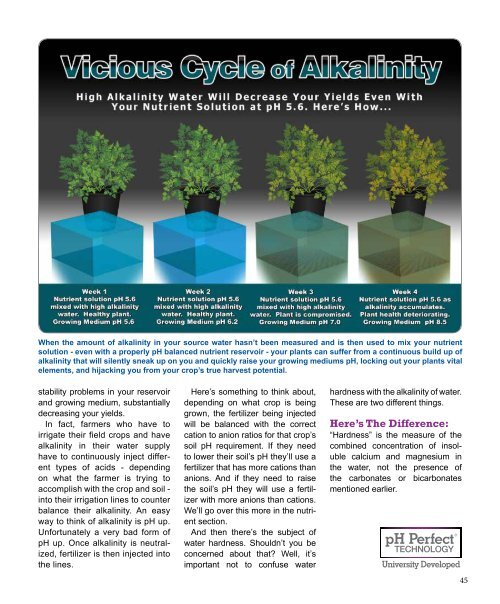Create successful ePaper yourself
Turn your PDF publications into a flip-book with our unique Google optimized e-Paper software.
When the amount of alkalinity in your source water hasn’t been measured and is then used to mix your nutrient<br />
solution - even with a properly pH balanced nutrient reservoir - your plants can suffer from a continuous build up of<br />
alkalinity that will silently sneak up on you and quickly raise your growing mediums pH, locking out your plants vital<br />
elements, and hijacking you from your crop’s true harvest potential.<br />
stability problems in your reservoir<br />
and growing medium, substantially<br />
decreasing your yields.<br />
In fact, farmers who have to<br />
irrigate their field crops and have<br />
alkalinity in their water supply<br />
have to continuously inject different<br />
types of acids - depending<br />
on what the farmer is trying to<br />
accomplish with the crop and soil -<br />
into their irrigation lines to counter<br />
balance their alkalinity. An easy<br />
way to think of alkalinity is pH up.<br />
Unfortunately a very bad form of<br />
pH up. Once alkalinity is neutralized,<br />
fertilizer is then injected into<br />
the lines.<br />
Here’s something to think about,<br />
depending on what crop is being<br />
grown, the fertilizer being injected<br />
will be balanced with the correct<br />
cation to anion ratios for that crop’s<br />
soil pH requirement. If they need<br />
to lower their soil’s pH they’ll use a<br />
fertilizer that has more cations than<br />
anions. And if they need to raise<br />
the soil’s pH they will use a fertilizer<br />
with more anions than cations.<br />
We’ll go over this more in the nutrient<br />
section.<br />
And then there’s the subject of<br />
water hardness. Shouldn’t you be<br />
concerned about that? Well, it’s<br />
important not to confuse water<br />
hardness with the alkalinity of water.<br />
These are two different things.<br />
Here’s The Difference:<br />
“Hardness” is the measure of the<br />
combined concentration of insoluble<br />
calcium and magnesium in<br />
the water, not the presence of<br />
the carbonates or bicarbonates<br />
mentioned earlier.<br />
45


